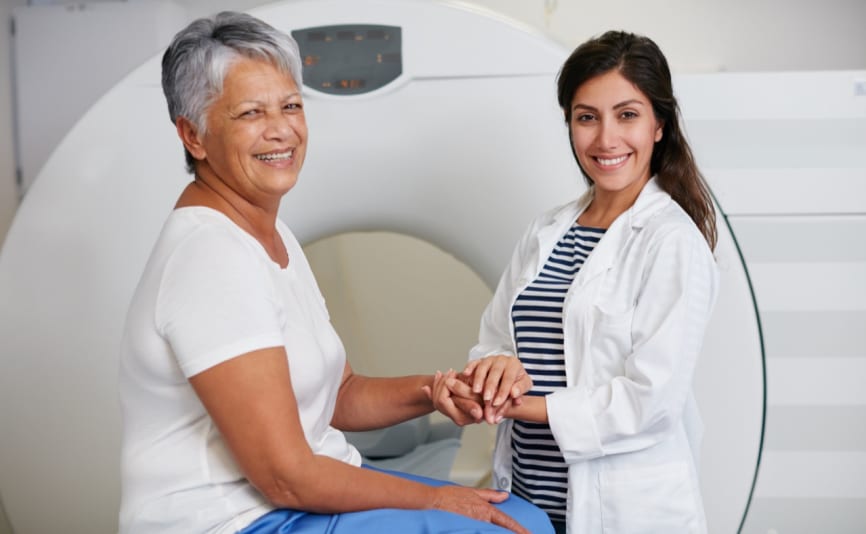Claustrophobia is defined as a fear of confined spaces, and an estimated 10% of people in the UK experience it during their lifetime. Alongside anxious feelings, claustrophobia can cause physical symptoms such as hot flushes, shortness of breath, and dizziness.
Claustrophobia within an MRI setting is more common than you might think, affecting between 1% and 15% of all patients scheduled for MR imaging.
Traditional MRI scanners are cylinder-shaped, and patients lie on a motorized flat bed that is moved in and out of the tube. The walls of the scanner contain strong magnets, which must surround the patient to capture clear images of their body. This is usually the reason why MRI scans make some people feel claustrophobic.
Depending on the body part being scanned, you will enter the scanner either head first or feet first. The length of each scan also varies between 15-90 minutes based on the size of the area being scanned.
The process can be quite noisy, and you will hear loud clicking, buzzing, and ringing caused by coiled wires expanding and contracting as electrical currents pass through them. You will be provided with headphones and/or earplugs for your scan, and you can usually choose the music you want to listen to.
Open MRI scanners use the same magnetic technology as their predecessors, but they are newer machines with open sides.
This means the scanner is less like a tube, and more like an arc, or will have magnets above and below you instead of all around you. This means you will be able to see outside the scanner into the room, and the level of noise is significantly reduced.
Some open scanners are also upright, allowing patients to sit or stand during the scan.
The rising demand for open scanners has driven down the cost of the equipment, but these types of scan are comparatively more expensive than traditional MRI scans. They also are less commonly available on the NHS, and sedation is usually offered instead of an open scan unless you seek private care.
📢 We offer self-book open MRI scans at two locations, without the need for NHS referral.
Whether you decide to have a traditional or open MRI scan, there are several coping strategies you can use to reduce anxiety and beat your MRI claustrophobia.
- Communication
Communication doesn't have to stop when the scan begins. You will be given a call button to attract attention, and your radiographer will monitor you throughout via a screen. You will also be able to hear the technician's voice through your headphones or speakers within the scanner.
- Meditation and mindfulness
- Choose audio that you will enjoy
- Bring an eye mask
- Invite a supportive friend or family member
MRI is one of the most important medical innovations for understanding and assessing health concerns. While scans can be daunting for people with claustrophobia, there are plenty of options available to ensure you benefit from diagnostic imaging.
- Book a private MRI in an open scanner, with over 100 centres to choose from
- Learn more about MRI scans on our news page
Sources used:
https://www.nhs.uk/mental-health/conditions/claustrophobia/
https://www.nhs.uk/conditions/mri-scan/what-happens/
https://www.elliothospital.org/website/diagnostic-imaging-mri-faqs-why-does-the-mri-machine-make-so-much-noise.php
https://www.anxietyuk.org.uk/blog/say-no-to-the-mri-tunnel/
https://usir.salford.ac.uk/id/eprint/40600/
https://www.hospitaltimes.co.uk/how-claustrophobia-can-affect-mri-patients-and-the-nhs/
https://radiology.ucsf.edu/patient-care/prepare/claustrophobia-mri https://blog.radiology.virginia.edu/reducing-mri-claustrophobia/
https://pubmed.ncbi.nlm.nih.gov/17610281/
https://www.ncbi.nlm.nih.gov/pmc/articles/PMC3045881/
https://www.verywellmind.com/claustrophobia-and-medical-procedures-2671907






